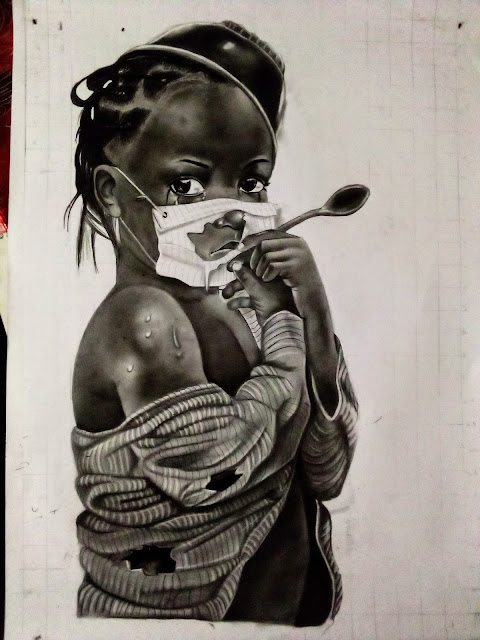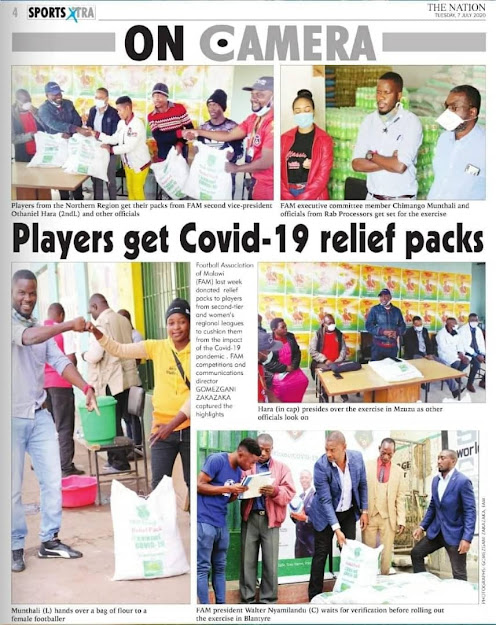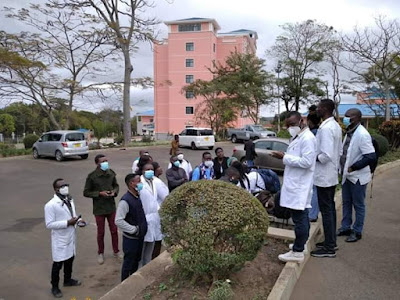Tuesday, 1 December 2020
Tuesday, 15 September 2020
'Santy' initiates Girls' Peer Support Club to Curb COVID Pregnancies
COVID-19 has affected many facets
of life and lately there have been reports concerning the rise of teenage
pregnancies. Though reasons could vary from place to place depending on the
different socio-cultural settings, many believe that the closure of schools as
a measure of managing the spread of COVID-19 has significantly contributed to
the rising numbers of teenage pregnancies. In Dedza, the district gender
officer confirmed that ‘all men who impregnated and married young girls below
the age of 18 during the COVID-19 pandemic period will be arrested.’
In Mangochi district where high numbers of teenage pregnancies have also been reported, a female artist ‘Santy’ initiated a girl’s peer support club to assist in fighting against the problem. The club which started as a casual conversation among girls has grown into a structured club with specific themes that are covered following the ‘GO GIRLS’ curriculum.
Santy (Asante Asiatu Emment) described the club as effective in keeping girls engaged with relevant but interesting topics about sexual reproductive health, COVID-prevention, staying in school among several other topics. The club promotes the use of poems, games, stories and songs in describing experiences, challenges and solutions.Santy is an alumnus of the Malawi Music Project, an annual event organized by Music Crossroads Malawi and Peace Corps Malawi which encourages the use of art to tackle social issues, learn more here Malawi Music Project.
Santy also did a COVID-19 awareness song titled Tipewe COVID-19 Some of
her songs can be found here Santy
Music
Drawing the picture - COVID impacts
Primary school children in rural
parts of Malawi normally get free meals at school; but, when the coronavirus
pandemic forced schools to close in March 2020, families were left with the
added cost burden for meals. The young learners receive hot porridge made from
maize or soya bean flour mixed with salt and sugar. The aim is to increase enrollment
for children who might fail to attend classes because of hunger in their
families, and to meet the nutrition needs of the students.
Mawofozi, a drawing artist
attempted to tell the story in this piece of art. The drawing describes both
the frustration associated with closing of schools as well as the hope that we
can keep our spoons and plates as schools are ready to reopen.
@Conservation Arts 2020; Art + Activism Against Repression During the Covid-19 Crisis,
Open Society Foundations grant, Centre for Applied Human Rights - University of York (UK)
Tuesday, 18 August 2020
#MaskUp meets #Mask4AllMalawi (Mandatory Mask wearing gazetted as law)
#MaskUp meets #Mask4AllMalawi
By Harold Kapindu
Covid 19 harshtags have flooded both the international and local social media. The most outstanding, or rather the ones that have attracted my attention are #MaskUp and #Mask4AllMalawi.
With the surge in Covid 19 cases, the new campaign under the harshtag #MaskUp is picking up momentum on social media with local celebrities and public figures joining the cause in order to promote consistent and proper wearing of face masks in public spaces.
Founded and spearheaded by musician Piksy and arts promoter, social behavior change and media expert Edward Kankhomba, the movement so far has a number of musicians, fashion designers, poets and television personalities.
Some notable names seen in a large e-poster that is updated on daily basis include Daniel Thom also known as Super DT, a TV host/presenter at Mibawa TV, musician Vube and Youth Health activist Blesssings Banda.
To join the movement, one simply has to wear a mask, take a picture and post it on social media with the MaskUp harshtag. The team then collects the pictures which are updated daily on the campaign's e-poster.
Also, advocating for the same cause, its another campaign dubbed Masks4AllMalawi aiming at producing and distributing made in Malawi community masks to the total population of 19 million.
The campaign has so far manufactured millions of Made-in-Malawi community masks and has reached
a production rate of greater than 420,000 per day.
As part of the #Masks4AllMalawi campaign’s aim to achieve universal mask coverage, the campaign has also provided 31,500 community masks to the Malawi Prison Service, enough for all prisoners and guards.
An analysis of the potential impact of Universal Mask Usage as part of a comprehensive overall solution, reveals some potentially startling figures.
For instance, in Hong Kong, where Voluntary Universal Mask Usage (VUMU) appears to be in operation, there have been 15 reported cases per 100, 000 population and 4 deaths, despite being bordered by China and having a densely populated population of 7.5 million.
This compares to 272 reported cases per 100, 000 population in the UK where VUMU is not enforced.
Corona virus is real and wearing of masks prevent transmission from person to person.
Log in on your social media platforms and type #MaskUp #Masks4AllMalawi #StayHome #StaySafe #WashHands #Sanitize #SocialDistance
The debate on re-opening schools amidst COVID-19
Henry Kachaje wrote
I know others feel we shouldn't open schools yet. Here are some questions to think about:
1) Since April, while the kids are not in school, how are they being protected? Have we locked them up in our houses? Is there strict social distancing being practiced in our communities?
(Please, don't think about ana akumpanda ku Namiwawa, Nyambadwe, Area 10, 43, (well to do residential areas) think about ana aku Mbayani, Chilomoni, Mtandire, Nchesi, (low income and crowded areas). Are these kids practicing Social distancing in these locations?
2) If we have not locked them up while they are not in school, how have they survived this far? What is it that they are doing that is keeping them safe?
3) What protective measures can we employ in the schools?
To be honest, very little can effectively be done especially in crowded government schools. But we can continue with regular washing of hands, etc.
Let us move on with life. Let's open schools. We are creating far worse challenges by keeping schools closed indefinitely.
Ma vaccine anayimatu, teenage pregnancies are on the rise, early child marriages, alcohol abuse, HIV aids spread... Unfortunately, we are not tracking these challenges but just focusing on the new disease, Covid-19.
Then there are complex socioeconomic issues: Teachers starving, failing to pay rentals, private school owners failing to pay teachers, failing to service bank loans, businesses that service the education sector collapsying, etc.
Covid-19 is a complex problem but let us learn how to live with the virus. It has come to stay unfortunately, and life must go on.
Monday, 10 August 2020
A covid-19 pandemic "coincides?" with a teen pregnancy-demic.
The number of confirmed COVID-19 cases since schools closed stands at 3 665 as of Sunday (at 26.7.20) and in two districts alone (Mulanje and Mangochi) there are nearly 15, 000 teenage pregnancies that have been accounted for in the last few months. In Mangochi alone, at least 40 young girls are falling pregnant every day.
Primary school learners under Senior Chief Dambe in Mchinji have petitioned traditional leaders demanding immediate action following rising cases of child marriages and teenage pregnancies in the area.
Through the petition presented to Senior Chief Dambe, the learners among other things are demanding quick review of by-laws and formulation of a special task force to deal with issues of child marriages and teenage pregnancies.
Meanwhile, the latest survey conducted early last month by education authorities in 13 primary school zones in the district revealed that about 80 girls became pregnant, while about 130 young boys and girls entered into marriage since the closure of schools in March this year due to Covid-19.
COVID-19 Prevention measures should seriously consider protecting the youth, Let's protect our young ones before they become a demographic burden. They are a majority by the way.
Sunday, 19 July 2020
Who is taking care of ARTISTS????
COVID Stories Gallery
 |
| Should we open Schools? |
 |
| Are these COVID deaths? |
 |
| No escaping |

Monday, 6 July 2020
The Social Cost for Managing COVID-19
Analysing the COVID-19
crisis in developing countries like Malawi, it is apparent that managing the
spread of the pandemic comes at a cost. This article aims at highlighting some
of the social costs that as a society we are paying in order to manage
COVID-19. There are so many social costs that we are paying as individuals and
communities. This article will not highlight all the issues; rather it intends
to bring awareness on some of the issues that may be overlooked due to the
overwhelming nature of corona virus disease.
Psychosocial
Trauma for Health Workers
Along with its high infectivity and fatality rates, the 2019 Corona Virus Disease (COVID-19) has
caused universal psychosocial impact by causing mass hysteria, economic burden and financial losses. Of specific interest in Malawi are the Health care workers. In addition to minimal wages, lack of equipment and inadequate training, health workers risk their lives every day taking care of infected patients, witnessing higher rates of death and experiencing breakdowns of protocol and support. These acute stresses could lead to mental health issues, yet therapeutic support is also not sufficient. We hope that our government will recognize these sacrifices and put in place measures that will support the mental wellbeing of health workers.Blame Game between Urban
and Rural Settlers
The origin and the
spread pattern of COVID-19 in Malawi have the background related to foreign
travel usually by the population in urban communities. This has created a
notion where by rural settlers shifting the blame to the urban community. One
interviewee bluntly said ‘the people that travel in and out of the country are
responsible for the spread of COVID-19 in the country’. This line of thinking
has seen some communities refusing to welcome their relatives from Republic of
South Africa due to the fears that there are more COVID-19 cases where they are
coming from. This comes barely weeks after 400 returnees escaped the quarantine
centre creating fears of an outbreak within the urban community. Some of the
returnees complained that the stadium (quarantine centre) had no water, no
toilets and the government was not providing them with food https://www.nyasatimes.com/malawi-at-risk-400-returnees-escape-from-covid-19-test-centre-in-blantyre/
Now that the
campaign period is over, new government has been sworn in, hopes are high that
the new government will prioritize public safety and welfare. Hopes are high
that COVID-19 management will be more effective.
Increased Cases of
Teenage Pregnancies
Managing the spread
of COVID-19 in Malawi comes at a high social cost especially for adolescent
girls. Schools are still closed since 23rd March, 2020. This new
normal has definitely added the burden on parents. For most parents, sending
kids to school is one way of making sure that their children are occupied with
productive learning tasks. Having schools closed means that children stay at home
most of the times, if they are not home parents get more worried.
As the COVID-19
pandemic rages on, the number of women unable to access family planning, facing
unintended pregnancies, gender-based violence and other harmful practices could
skyrocket by millions of cases in the months ahead https://malawi.unfpa.org/en/news/new-unfpa-projections-predict-calamitous-impact-womens-health-covid-19-pandemic-continues-12
COVID-19 will
disrupt efforts to end child marriage. Adolescence is a time of transitions
that foster both challenges and opportunities. Indeed, choices made during
adolescence not only have immediate consequences but also greatly influence the
economic opportunities, health outcomes, and skill sets attained later in life,
and yet it is the same period when social norms create pathways largely defined
by gender. COVID-19 is creating loopholes for high rates of teenage
pregnancies.
Tuesday, 30 June 2020
COVID-19 Overshadows Environmental Arts
Thursday, 25 June 2020
Saturday, 20 June 2020
Cricky hopes for the best after COVID-19
"Put passion first before money. If you have that hunger, you are going to overcome," advises the seemingly hungry Cricky.
Besides his personal life as a martial artist, Cricky Justice is one the country's most talented videographers who has worked with corporate companies and organizations such as Glam and Glory Cosmetics, Conservation Music Malawi and big artists such as Phyzix, Vube, Prince Martin.
He has covered big events such as Lake of Stars, Livingstonia Beach Festival and Its Only Entertainment's (IOE) Ghetto Festivals.
Cricky owns Dazzle Media which was previously operating from a small studio in area 49, Lilongwe.
The studio's small space made it a bit problematic for Cricky to operate freely, let alone attract groups such as music choirs and large families for a photoshoot either on a blue screen inside or outside the studio.
Earlier this year, Cricky moved in into a big studio in area 25 A where business started picking up. Then, the harsh reality struck following the confirmation of Covid 19 cases in Malawi.
"Despite the current pandemic, one of the good things that have happened is moving from a small to a bigger operating space. We had high expectations and we were hoping to reach a certain target.
"We were supposed to have a grand launch but up until now we still haven't formally launched our studios. We are just being cautious and taking precautions," Cricky says.
Fear and uncertainty grips the nation as the Malawi government had also contemplated a possible lockdown which was later challenged in court and blocked with an injunction obtained by the Human Rights Defenders Coalition, HRDC.
HRDC argued that a lockdown would infringe people's rights because most Malawians work in the informal sector and survive on hand to mouth. Worse still, the Malawi government was unclear on how the poor would be cushioned.
For instance, elsewhere in the world, developed nations gave out cash and food stuffs to the underprivileged during lockdowns, something developing nations like Malawi couldn't manage to do.
Though the lockdown was blocked, people still live in fear and business isn't as usual.
Despite live events such as wedding ceremonies, festivals and shows slowly resuming, the initial cancellation has had a far reaching negative effect on creatives, specifically photographers like Cricky who hustle from such events.
"The Covid 19 has greatly affected my hustle. Business has been bad because we are not getting any bookings for shows. The rentals are quite expensive, but I can't do otherwise because I have bigger dreams and I believe, this too, shall come to pass," Cricky explains.
He adds, "Corona virus has happened. We have to adapt and move on. Our economy has to get back on track."
His recent work is 'What is this?' video which talks about the mystery of COVID-19. composed and performed by Zinja and Ed. Follow the link below
https://youtu.be/1gZ9YYgKiIw
Monday, 8 June 2020
Environmentalists Engage Artists on World Environmental Day
Movement for Environmental Action in partnership with Lilongwe Wildlife Trust on 5th June joined the rest of the world in commemorating World Environmental Day.
The two partnered with Conservation Music Malawi artists and Association of Environmental Journalists on commemoration activities.
The activities started with clearing of plastics at Lilongwe Wildlife Center along Lingadzi river and a recorded discussion on Biodiversity on Zodiak Broadcasting Station as well as a live stream performance.
Kelicia Chingeni, Movement for Environmental Action media and advocacy committee member says, “The Wilderness trails along the lingadzi river at Lilongwe Wildlife centre have so much garbage in particular plastic. Plastic is dangerous to both aquatic life and human life.
Full article https://265entmw.live/environmentalists-engage-artists-on-world-environmental-day-activities/














